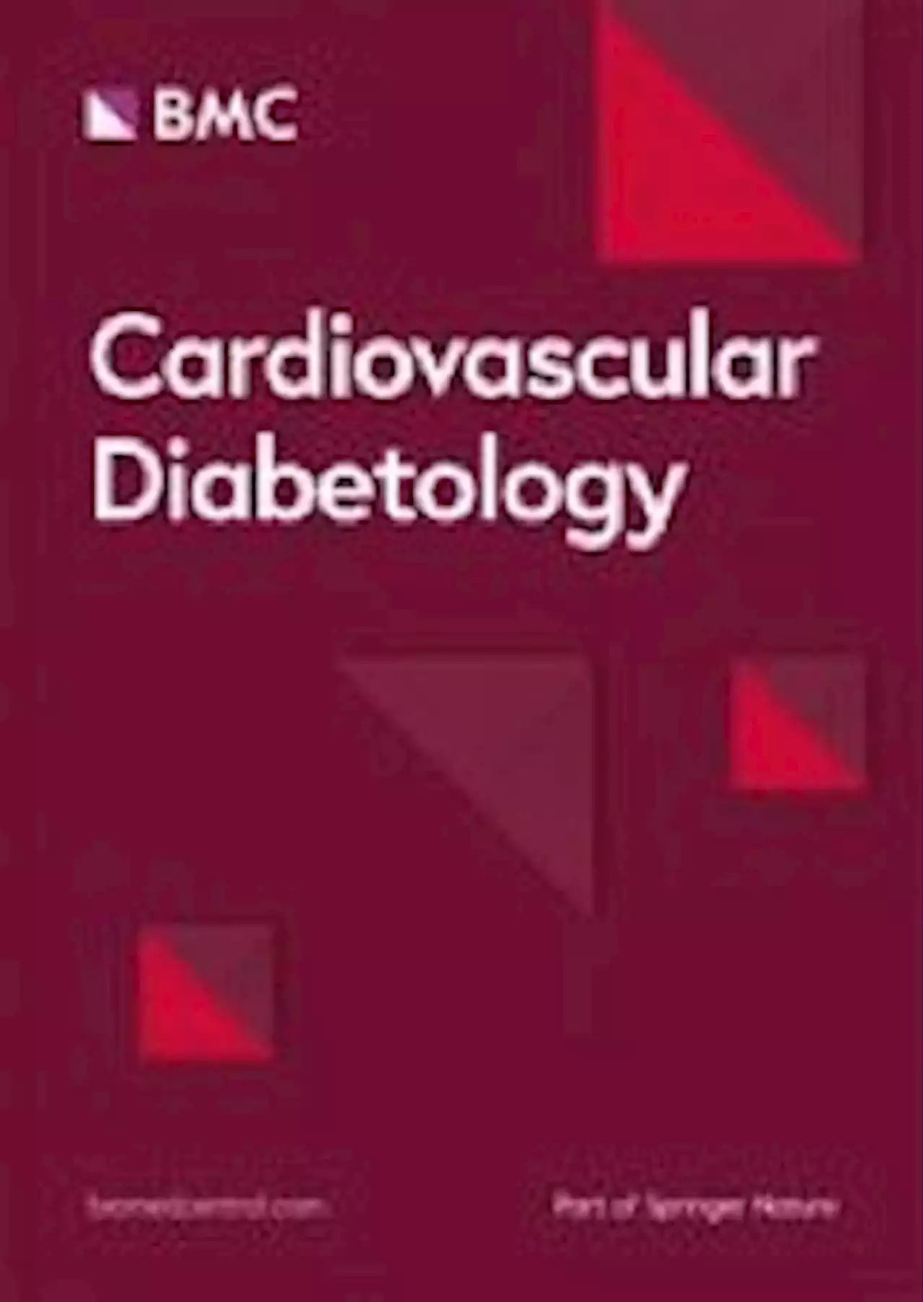A study in Cardiovascular Diabetology finds that elevated triglycerides are highly prevalent in statin-treated patients within one year after type 2 diabetes diagnosis. This finding could be used for additional therapies to prevent cardiovascular disease.
The study was approved by the Danish Health Data Authority and registered at Aarhus University on behalf of the Danish Data Protection Agency . According to Danish legislation, ethical committee approval is not needed for register-based studies.M.M. is supported by a grant from the Novo Nordisk Foundation and has received lecture and advisory board fees from Novo Nordisk, Denmark. M.B.M has received lecture fees from Novo Nordisk, Amgen, Amarin, AstraZeneca and Sanofi.
Adjusted hazard ratios of CVD events associated with triglyceride levels in statin-treated T2DM patients: Additional adjustment for LDL cholesterol .Adjusted hazard ratios of CVD events associated with triglyceride levels in statin-treated T2DM patients: Triglycerides measured within 180 daysAdjusted hazard ratios of CVD events associated with the cut-off level for hypertriglyceridemia used in guidelines .
United States Latest News, United States Headlines
Similar News:You can also read news stories similar to this one that we have collected from other news sources.
 Comparative cardiovascular outcomes in type 2 diabetes patients taking dapagliflozin versus empagliflozin: a nationwide population-based cohort study - Cardiovascular DiabetologyBackground Sodium-glucose co-transporter-2 inhibitors displayed cardiovascular benefits in type 2 diabetes mellitus in previous studies; however, there were some heterogeneities regarding respective cardiovascular outcomes within the class. Furthermore, their efficacies in Asians, females, and those with low cardiovascular risks were under-represented. Thus, we compared the cardiovascular outcomes between new users of dapagliflozin and empagliflozin in a broad range of patients with type 2 diabetes mellitus using a nationwide population-based real-world cohort from Korea. Methods Korean National Health Insurance registry data between May 2016 and December 2018 were extracted, and an active-comparator new-user design was applied. The primary outcome was a composite of heart failure (HF)-related events (i.e., hospitalization for HF and HF-related death), myocardial infarction, ischemic stroke, and cardiovascular death. The secondary outcomes were individual components of the primary outcome. Results A total of 366,031 new users of dapagliflozin or empagliflozin were identified. After 1:1 nearest-neighbor propensity score matching, 72,752 individuals (mean age approximately 56 years, 42% women) from each group were included in the final analysis, with a follow-up of 150,000 ~ person-years. Approximately 40% of the patients included in the study had type 2 diabetes mellitus as their sole cardiovascular risk factor, with no other risk factors. The risk of the primary outcome was not different significantly between dapagliflozin and empagliflozin users (hazard ratio [HR] 0.93, 95% confidence interval [CI] 0.855–1.006). The risks of secondary outcomes were also similar, with the exception of the risks of HF-related events (HR 0.84, 95% CI 0.714–0.989) and cardiovascular death (HR 0.76, 95% CI 0.618–0.921), which were significantly lower in the dapagliflozin users. Conclusions This large-scale nationwide population-based real-world cohort study revealed no significant diffe
Comparative cardiovascular outcomes in type 2 diabetes patients taking dapagliflozin versus empagliflozin: a nationwide population-based cohort study - Cardiovascular DiabetologyBackground Sodium-glucose co-transporter-2 inhibitors displayed cardiovascular benefits in type 2 diabetes mellitus in previous studies; however, there were some heterogeneities regarding respective cardiovascular outcomes within the class. Furthermore, their efficacies in Asians, females, and those with low cardiovascular risks were under-represented. Thus, we compared the cardiovascular outcomes between new users of dapagliflozin and empagliflozin in a broad range of patients with type 2 diabetes mellitus using a nationwide population-based real-world cohort from Korea. Methods Korean National Health Insurance registry data between May 2016 and December 2018 were extracted, and an active-comparator new-user design was applied. The primary outcome was a composite of heart failure (HF)-related events (i.e., hospitalization for HF and HF-related death), myocardial infarction, ischemic stroke, and cardiovascular death. The secondary outcomes were individual components of the primary outcome. Results A total of 366,031 new users of dapagliflozin or empagliflozin were identified. After 1:1 nearest-neighbor propensity score matching, 72,752 individuals (mean age approximately 56 years, 42% women) from each group were included in the final analysis, with a follow-up of 150,000 ~ person-years. Approximately 40% of the patients included in the study had type 2 diabetes mellitus as their sole cardiovascular risk factor, with no other risk factors. The risk of the primary outcome was not different significantly between dapagliflozin and empagliflozin users (hazard ratio [HR] 0.93, 95% confidence interval [CI] 0.855–1.006). The risks of secondary outcomes were also similar, with the exception of the risks of HF-related events (HR 0.84, 95% CI 0.714–0.989) and cardiovascular death (HR 0.76, 95% CI 0.618–0.921), which were significantly lower in the dapagliflozin users. Conclusions This large-scale nationwide population-based real-world cohort study revealed no significant diffe
Read more »
 The genetics of resting heart rate and its connection to cardiovascular disordersThe genetics of resting heart rate and its connection to cardiovascular disorders NatureComms heartrate cardiovasculardisease cardiovascular heartrate restingheartrate
The genetics of resting heart rate and its connection to cardiovascular disordersThe genetics of resting heart rate and its connection to cardiovascular disorders NatureComms heartrate cardiovasculardisease cardiovascular heartrate restingheartrate
Read more »
 How are genetics, lifestyles, and cardiovascular and thromboembolic events associated following COVID-19 diagnosis?How are genetics, lifestyles, and cardiovascular and thromboembolic events associated following COVID-19 diagnosis? NatureComms genetics lifestyles cardiovascular thromboembolic covid COVID19 SARSCoV2
How are genetics, lifestyles, and cardiovascular and thromboembolic events associated following COVID-19 diagnosis?How are genetics, lifestyles, and cardiovascular and thromboembolic events associated following COVID-19 diagnosis? NatureComms genetics lifestyles cardiovascular thromboembolic covid COVID19 SARSCoV2
Read more »
 Huge Scandi-style homeware store rivalling IKEA is opening in Greater ManchesterIt's set to be the Danish brand's BIGGEST store in the country - with a huge 70% off sale
Huge Scandi-style homeware store rivalling IKEA is opening in Greater ManchesterIt's set to be the Danish brand's BIGGEST store in the country - with a huge 70% off sale
Read more »
 Comparative cardiovascular outcomes in type 2 diabetes patients taking dapagliflozin versus empagliflozin: a nationwide population-based cohort study - Cardiovascular DiabetologyBackground Sodium-glucose co-transporter-2 inhibitors displayed cardiovascular benefits in type 2 diabetes mellitus in previous studies; however, there were some heterogeneities regarding respective cardiovascular outcomes within the class. Furthermore, their efficacies in Asians, females, and those with low cardiovascular risks were under-represented. Thus, we compared the cardiovascular outcomes between new users of dapagliflozin and empagliflozin in a broad range of patients with type 2 diabetes mellitus using a nationwide population-based real-world cohort from Korea. Methods Korean National Health Insurance registry data between May 2016 and December 2018 were extracted, and an active-comparator new-user design was applied. The primary outcome was a composite of heart failure (HF)-related events (i.e., hospitalization for HF and HF-related death), myocardial infarction, ischemic stroke, and cardiovascular death. The secondary outcomes were individual components of the primary outcome. Results A total of 366,031 new users of dapagliflozin or empagliflozin were identified. After 1:1 nearest-neighbor propensity score matching, 72,752 individuals (mean age approximately 56 years, 42% women) from each group were included in the final analysis, with a follow-up of 150,000 ~ person-years. Approximately 40% of the patients included in the study had type 2 diabetes mellitus as their sole cardiovascular risk factor, with no other risk factors. The risk of the primary outcome was not different significantly between dapagliflozin and empagliflozin users (hazard ratio [HR] 0.93, 95% confidence interval [CI] 0.855–1.006). The risks of secondary outcomes were also similar, with the exception of the risks of HF-related events (HR 0.84, 95% CI 0.714–0.989) and cardiovascular death (HR 0.76, 95% CI 0.618–0.921), which were significantly lower in the dapagliflozin users. Conclusions This large-scale nationwide population-based real-world cohort study revealed no significant diffe
Comparative cardiovascular outcomes in type 2 diabetes patients taking dapagliflozin versus empagliflozin: a nationwide population-based cohort study - Cardiovascular DiabetologyBackground Sodium-glucose co-transporter-2 inhibitors displayed cardiovascular benefits in type 2 diabetes mellitus in previous studies; however, there were some heterogeneities regarding respective cardiovascular outcomes within the class. Furthermore, their efficacies in Asians, females, and those with low cardiovascular risks were under-represented. Thus, we compared the cardiovascular outcomes between new users of dapagliflozin and empagliflozin in a broad range of patients with type 2 diabetes mellitus using a nationwide population-based real-world cohort from Korea. Methods Korean National Health Insurance registry data between May 2016 and December 2018 were extracted, and an active-comparator new-user design was applied. The primary outcome was a composite of heart failure (HF)-related events (i.e., hospitalization for HF and HF-related death), myocardial infarction, ischemic stroke, and cardiovascular death. The secondary outcomes were individual components of the primary outcome. Results A total of 366,031 new users of dapagliflozin or empagliflozin were identified. After 1:1 nearest-neighbor propensity score matching, 72,752 individuals (mean age approximately 56 years, 42% women) from each group were included in the final analysis, with a follow-up of 150,000 ~ person-years. Approximately 40% of the patients included in the study had type 2 diabetes mellitus as their sole cardiovascular risk factor, with no other risk factors. The risk of the primary outcome was not different significantly between dapagliflozin and empagliflozin users (hazard ratio [HR] 0.93, 95% confidence interval [CI] 0.855–1.006). The risks of secondary outcomes were also similar, with the exception of the risks of HF-related events (HR 0.84, 95% CI 0.714–0.989) and cardiovascular death (HR 0.76, 95% CI 0.618–0.921), which were significantly lower in the dapagliflozin users. Conclusions This large-scale nationwide population-based real-world cohort study revealed no significant diffe
Read more »
